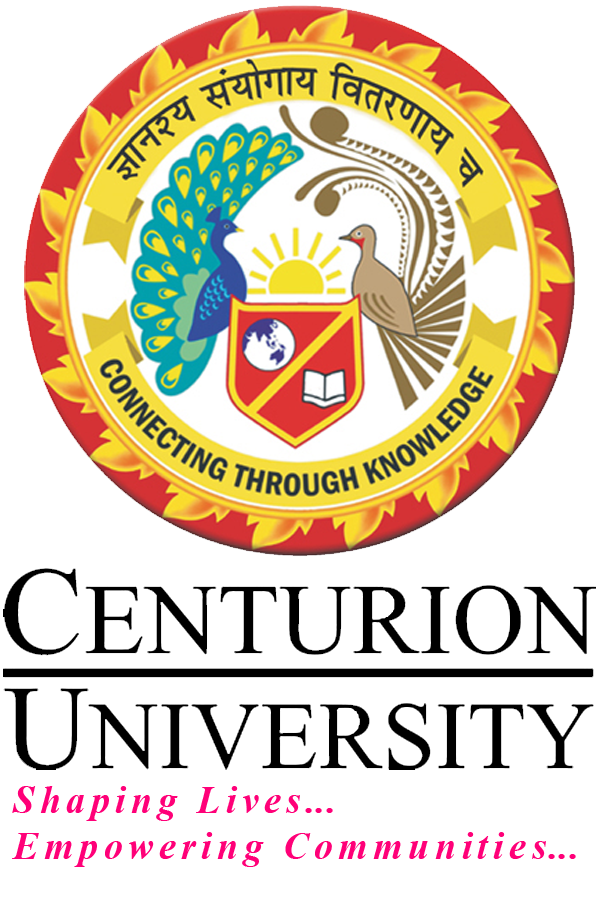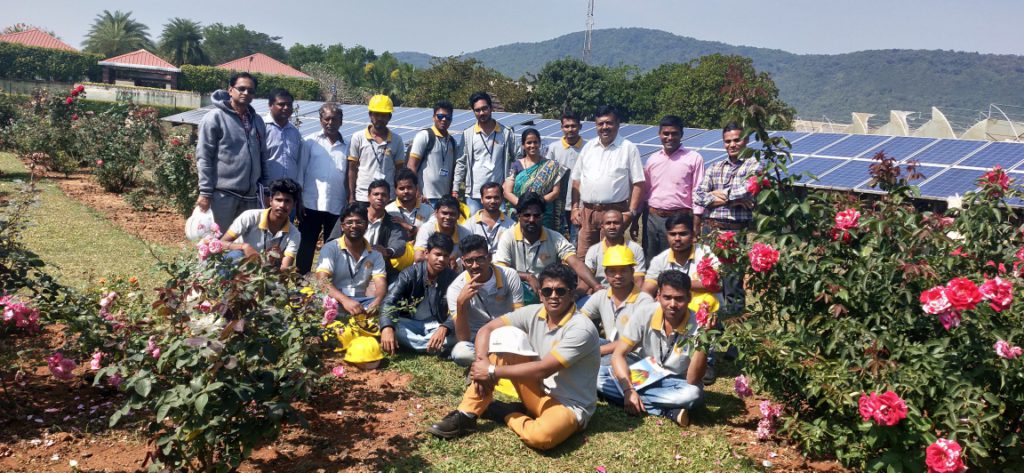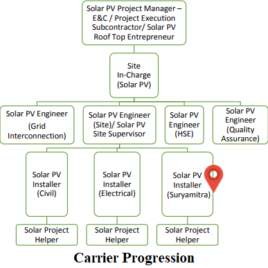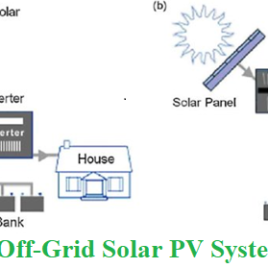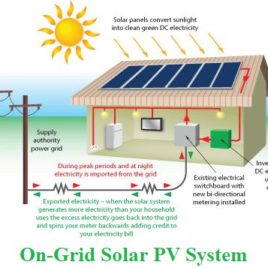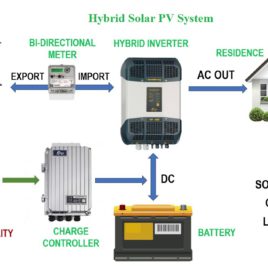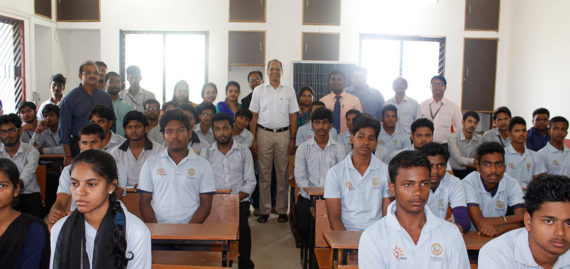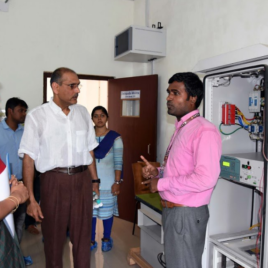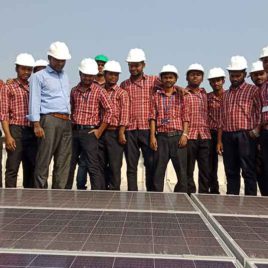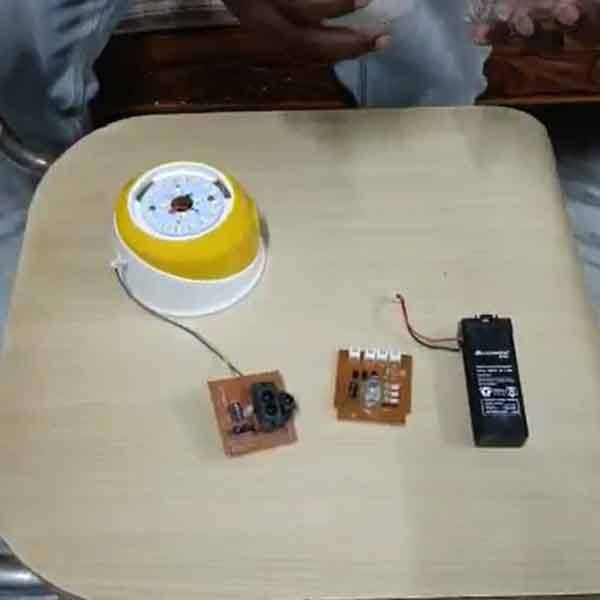This is a skill-oriented course to provide hands-on practice and project work in the study of solar photovoltaic (PV) technology, systems and it's equipment's such as solar modules/panels, charge controller, inverter, battery, and electrical/electronic/mechanical appliances.
Solar PV Installation
Course Attendees
Still no participant
Course Reviews
Still no reviews
Code(Credit) : CUTM3073 (0-3-1)
| Scheme | Skill for Success (SFS) |
| NSQF Level | 4 |
| Duration | 4 Months |
| Sector | Skill Council for Green Jobs (SCGJ) |
| Occupations | Design and Installation |
| Entry Qualification | ITI/Diploma/B. Tech/Applied Science/ Agriculture |
| Minimum Age | 16 Years |
| Aligned to (QP) | QP-SGJ-Q0101_Solar-PV-Installer_Suryamitra_v1-9-4-2017.pdf |
Course Objectives:
The objectives of this subject are:
- To develop and understanding sustainable development goals (SDGs) for our society
- To develop and familiarization with the principles, technology, materials, and tools required for solar PV system.
- To develop an end-to-end technical understanding to execute solar PV installation and O&M
- To comply the industry specifications, guidelines and safety standards during work
After completing this program-
- The trainee will be exposed to current solar PV requirements, issues, challenges, and debates.
- The trainee will be able to develop an understanding of perspective on SDGs.
- The trainee will expert on load calculation, design, and installation of the Solar PV System.
- Can join industry as solar project helper and will progress further as solar PV installer then to solar PV engineer and can reach up to Solar PV project manage.
- Can become a Quality Assurance person in solar PV installation after gaining experience.
- Can do Diploma or any Advance program or course in the same.
- Can become entrepreneur in the related field.
Learning Record:
The trainee will submit a Practice/Project/Learning record after each class/session.
Assessment Process:
- The assessment agencies should have an expert to conduct assessment NOS wise and every trainee should score a minimum of 70% in the overall assessment.
- The assessment of the theory/knowledge will be based on a written test/viva-voce or both while the skill test shall be hands-on practical.
Course Syllabus/Contents:
Module 1: Work Organization and management (2 hour), SGJ/N0101
Overview and applications in multiple sectors, Work technical terminology and symbols, theory and applications of mathematics, physics, and geometry, Standards currently used and recognized by industry, Current internationally recognized standards, Health and safety legislation and best practice including specific safety.
- Practice 1: Site visit to acquire knowledge on Solar powered Projects.
Module 2: Site survey and customer's requirement (4 hours), SGJ/N0101, ELE/N5903
- Practice 2: Measurement of latitude and longitude and it's application (shadow analysis) in Solar module installation.
- Practice 3: Preparation of single line diagram (System layout) of the system.
Module 3: Basics of electrical, electronics and solar energy (6 hours), SGJ/N0101
- Practice 4: Identify and carry out operation of different electrical components used in solar PV system.
- Practice 5: Perform simple calculation of power, energy, radiation etc.
- Practice 6: Identify and specify mono, poly and thin film type of solar cell/panel.
Module 4: Basics of SPV system and components (8 hrs), SGJ/N0101, SGJ/N0102
- Practice 7: Identify the different components of a SPV system components and it's operation.
- Practice 8: Identify and specify the lead acid, maintenance free, and Li-ion battery.
- Practice 9:Identify and specify the PWM & MPPT type CCR.
- Practice 10:Identify and specify the different types of inverter.
Module 5: Design and Installation of SPV System (8 hours), SGJ/N0103, SGJ/N0104
- Practice 11:Performance of solar PV module at varying tilt angle.
- Practice 12: Design and validation of Solar On-Grid/Off-Grid/hybrid system.
- Practice 13: Identify tools & tackles used for civil/mechanical/electrical installation.
- Practice 14: Plan and design of civil and Mechanical structure.
Module 6: Testing and Commissioning of SPV System (6 hours), SGJ/N0105
- Practice 15: Installation and connection practice of solar PV modules on the structure.
- Practice 16: Installation and connection practice of CCR and inverter at site.
- Practice 17: Installation and connection practice of solar battery at site.
- Practice 18: IV characteristics of solar cell/module.
Optional
- Practice 19: Conduct the testing of all the solar components of the Solar PV system including fault finding, continuity checks, polarity check and other commissioning activities.
- Practice 20: Carry out maintenance activities required for each component.
List of Projects/Products/Publications :
(15 hours: One project is to be chosen by group of students. Maximum group size is 5)
- Design and validation of Solar Off-grid/On-grid system.
- Design and validation of Solar Charge Controller.
- Design and validation of Portable Solar DC Fan.
- Design and validation of Solar Powered Hand-free Sanitizer.
- Design and validation of Solar Cap/Bag.
- Design and validation of Solar Street Light.
- Design and validation of Solar Study Lamp.
- Design and validation of Solar Grass Trimmer.
- Design and validation of Solar Emergency Light.
- Design and validation of Solar Powered Irrigation System.
- Design and validation of Battery Level Indicator.
- Design and validation of Solar Powered Mobile Charger.
Reference Book :
- Text Book:1. CS Solanki, Photovoltaic – Fundamentals, Technologies and Applications, PHI, 2015.
2. Solar Electricity Handbook - 2019 Edition: A Simple Practical Guide to Solar Energy - Author: Mr Michael Boxwel.
3.NC Giri, SR Nayak, SP Mishra, and SN Sahu, Project Management and Smart Electrical Systems, ISBN 9798587652200, Amazon; 1st edition, 27 December 2020. - Reference Book:
1. VVN Kishore, Renewable Energy Engineering and Technology : principles and practice, Teri, India, 2008.
2. SS Das, DD Behera, and NC Giri, Clean Energy Applications in Modern World, Notion Press, ISBN: 9781638069560, 2021.
3. Suneal Deambi, Photovoltaic System Design: Procedures, Tools and Applications, CRC Press, 2018.
4. Poornima Charantimath, Entrepreneurship Development and small Business Enterprises, Third edition, Pearson, 2018.
Session Plan:
Section 1
Foundation (online)- (1) Sharing the success stories of the area/course so far (2) Sharing clear roadmap to deliver the course (3) List of Projects/Products they have to make.
- Demo – Briefing on renewable energy, safety practices, tools to be used and their operation.
- Practice - Site visit to acquire knowledge on solar powered projects.
Web link:
Section 2
Foundation (online)- Steps involved in site survey and customer's requirement.
- Demo – Understand how to observe Sun path diagram and shading analysis.
- Practice -Measurement of latitude and longitude and it's application (shadow analysis) in Solar module installation.
Section 3
Foundation (online)- Interpretation of drawings, material Handling and storage of components on-site.
- Demo- Demonstration of drawing and material handling process of the project site.
- Practice- Preparation of single line diagram (System layout) of the system
Section 4
Foundation (online) - Understand the basics of electricity and electrical concepts.
- Demo - Process of use electrical components.
- Practice - Identify and carry out operation of different electrical components used in solar PV system.
Section 5
Foundation (online) - Understand the knowledge on work, power, energy etc.
- Demo - Demonstration of work, power, energy and radiation calculation process.
- Practice - Perform simple calculation and measurement of power, energy, radiation etc.
Section 7
Foundation (online) - Understand the concept of SPV system and it's components.
- Demo - Site visit to analyse and specify the required SPV system.
- Practice - Identify the different components of a SPV system components and it's operation.
Section 6
Foundation (online)- Understand the concept of Solar cell, module/panel, string and array.
- Demo - Demonstration of solar cell/panel/string/array.
- Practice - Identify and specify mono, poly and thin film type of solar cell/panel.
Section 8
Foundation (online) - Basics of storage device ( Battery).
- Demo - Demonstration of different types of battery and it's application.
- Practice - Identify and specify the lead acid, maintenance free, and Li-ion battery.
- Web link: https://youtu.be/ZZ6BtEZChXc

Section 9
Foundation (online) - Basics of solar charge controller (CCR).
- Demo - Demonstration of different types of CCR and it's application.
- Practice - Identify and specify the PWM & MPPT type CCR.
- Web link: https://youtu.be/UxAesEINhHE

Section 10
Foundation (online) - Basics of inverter.
- Demo - Demonstration of different types of inverter and it's application.
- Practice - Identify and specify the different types of inverter.
- Web link: https://www.youtube.com/watch?v=J_WE3snTMSs

Section 11
Foundation (online) -Load calculation and sizing of SPV system.
- Demo - Demonstration of rating identification of SPV system.
- Practice - Performance of solar PV module at varying tilt angle.
Section 12
Foundation (online) - Concept on On-grid and Off-grid system.
- Demo - Site visit for identification of On-grid, Off-grid and hybrid system.
- Practice - Design and validation of Solar On-Grid/Off-Grid/hybrid system.
Section 13
Foundation (online) -Understand and acquire knowledge on installation of the mounting structure along with structural supports and accessories for safe.
- Demo - Demonstration of different tools used in structure design.
- Practice - Identify tools & tackles used for civil/mechanical/electrical installation.
- Web link: https://drive.google.com/file/d/1lVO-IxMe_9a7a3uKjEE9KOVyVDHNJIDK/view?usp=sharing
Section 14
Foundation (online) - Understand the installation process of SPV system.
- Demo - Site visit to analyse of Solar system installation process.
- Practice - Plan and design of civil and Mechanical structure.
- Web link: https://www.youtube.com/watch?v=_SsWb0lwesQ

Section 15
Foundation (online) - Knowledge on Solar module installation.
- Demo - Site visit to acquire knowledge on Solar module installation at site.
- Practice - Installation and connection practice of solar PV modules on the structure.
Section 16
Foundation (online) - Knowledge on solar charge controller and inverter installation.
- Demo - Site visit to acquire knowledge on solar charge controller and inverter installation.
- Practice - Installation and connection practice of CCR and inverter at site.
Section 17
Foundation (online) - Knowledge on solar battery installation.
- Demo - Site visit to acquire knowledge on solar battery and it's application.
- Practice - Installation and connection practice of solar battery at site.
Section 18
Foundation (online) - Knowledge on electrical appliances for installation.
- Demo - Demonstration of electrical appliances (Light, bulb, fan,TV, pump, wire, meter, grounding, earthing etc.) for installation in a SPV system.
- Practice - IV characteristics of solar cell/module.
- Web link: https://www.youtube.com/watch?v=vE7dpQef9sc

Section 19
Foundation (online) - Understand the process of testing and commission process in a SPV system.
- Demo - Demonstration of fault finding and testing of a solar PV system.
- Practice - Conduct the testing of all the solar components of the Solar PV system including fault finding, continuity checks, polarity check and other commissioning activities.
- Web link: https://drive.google.com/file/d/1VkNIFgnLaodSssJy4D8DZ6dXwuoEtAlh/view?usp=sharing
Section 20
Foundation (online) -Understand the Typical faults, their causes and resolution for the all the components.
- Demo - Activities of preventive & reactive maintenance of the plant.
- Practice - Carry out maintenance activities required for each component.
List of Assignments (All have to complete the below assignments)
Assignment 1: Explain solar energy and its importance? Assignment 2: Explain the Sun Path diagram and write Latitude & Longitude? Assignment 3: Describe Shadow analysis and draw a single line diagram of any Solar PV system. Assignment 4: Brief on Electricity and different equipment are used in a Solar PV system. Assignment 5: Explain the concept of Solar cell, module/panel, string and array. Assignment 6: Basics of storage device ( Battery) and Load. Assignment 7: Basics of solar charge controller (CCR) & Inverter. Assignment 8: Load calculation and sizing of SPV system. Assignment 9: Installation of On-grid and Off-grid system. Assignment 10: Describe Operation & Maintenance of Solar PV systems.Industry Partnership :


Design Flow :
Latest News & Student Testimonials
CUTM3073 Testimonial | SKILL: Solar PV Installation | CUTM
Solar Bicycle | SKILL: Solar PV Installation | CUTM
Solar Sewing Machine | SKILL: Solar PV Installation | CUTM
Solar Powered Mini Car | SKILL: Solar PV Installation | CUTM
Media
Our Main Teachers

Assistant Professor, Dept of ECE & CREE Centurion University of Technology and Management Bhubaneswar, Odisha- 752050 India
